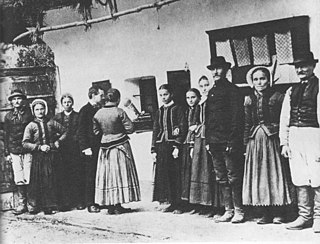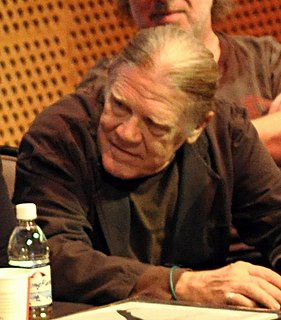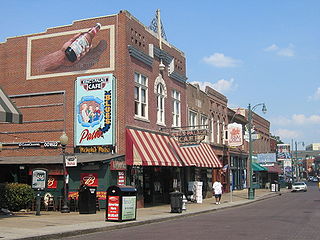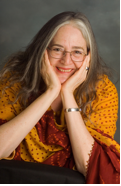
Folk music is a music genre that includes traditional folk music and the contemporary genre that evolved from the former during the 20th-century folk revival. Some types of folk music may be called world music. Traditional folk music has been defined in several ways: as music transmitted orally, music with unknown composers, music that is played on traditional instruments, music about cultural or national identity, music that changes between generations, music associated with a people's folklore, or music performed by custom over a long period of time. It has been contrasted with commercial and classical styles. The term originated in the 19th century, but folk music extends beyond that.

A jug band is a band employing a jug player and a mix of conventional and homemade instruments. These homemade instruments are ordinary objects adapted to or modified for making sound, like the washtub bass, washboard, spoons, bones, stovepipe, jew's harp, and comb and tissue paper. The term jug band is loosely used in referring to ensembles that also incorporate homemade instruments but that are more accurately called skiffle bands, spasm bands, or juke bands because they do not include a jug player.

Alan Lomax was an American ethnomusicologist, best known for his numerous field recordings of folk music of the 20th century. He was also a musician himself, as well as a folklorist, archivist, writer, scholar, political activist, oral historian, and film-maker. Lomax produced recordings, concerts, and radio shows in the US and in England, which played an important role in preserving folk music traditions in both countries, and helped start both the American and British folk revivals of the 1940s, 1950s, and early 1960s. He collected material first with his father, folklorist and collector John Lomax, and later alone and with others, Lomax recorded thousands of songs and interviews for the Archive of American Folk Song, of which he was the director, at the Library of Congress on aluminum and acetate discs.

Violeta del Carmen Parra Sandoval was a Chilean composer, singer-songwriter, folklorist, ethnomusicologist and visual artist. She pioneered the Nueva Canción Chilena, a renewal and a reinvention of Chilean folk music that would extend its sphere of influence outside Chile.

Northwest Folklife is an independent 501(c)(3) arts organization that celebrates the multigenerational arts, cultures, and traditions of a global Pacific Northwest.

Folk art covers all forms of visual art made in the context of folk culture. Definitions vary, but generally the objects have practical utility of some kind, rather than being exclusively decorative. The makers of folk art are typically trained within a popular tradition, rather than in the fine art tradition of the culture. There is often overlap, or contested ground with 'naive art'. "Folk art" is not used in regard to traditional societies where ethnographic art continue to be made.
Jackie Washington was a Canadian blues musician.

Budapest has long been an important part of the music of Hungary. Its music history has included the composers Franz Liszt, Ernő Dohnányi, Zoltán Kodály and Béla Bartók and the opera composer Ferenc Erkel.

Henry Stanford Diltz is an American folk musician and photographer who has been active since the 1960s.
Del Rey is an American blues singer and guitarist. Rey specializes in blues and jazz from 1900 to 1950. She developed a Women in American Music concert/lecture series to provide an historical and cultural look at the contribution of women to music in the early 20th century. She is recognized for her syncopated style of guitar and intricate finger picking.
The Center for Folklife & Cultural Heritage (CFCH) is one of three cultural centers within the Smithsonian Institution in the United States. Its motto is "culture of, by, and for the people", and it aims to encourage understanding and cultural sustainability through research, education, and community engagement. The CFCH contains (numerically) the largest collection in the Smithsonian, but is not fully open to the public. Its budget comes primarily from grants, trust monies, federal government appropriations, and gifts, with a small percentage coming from the main Smithsonian budget.

Sheila Kay Adams is an American storyteller, author, and musician from the Sodom Laurel community in Madison County, North Carolina.

Tourism in Memphis includes the points of interest in Memphis, Tennessee such as museums, fine art galleries, and parks, as well as Graceland the Beale Street entertainment district, and sporting events.

Zaza Korinteli, better known by his stage name Zumba, is a Georgian rock musician, folklorist and civic activist. His music fuses a wide variety of genres, principally Georgian folk tradition, rock, and reggae. Being a multi-instrumentalist on guitar, bass, wind instruments, percussions, and vocals, he leads the band ZumbaLand and also collaborates within several other musical projects. His stage name is an acronym of a Georgian phrase zogjer ubralod moindome, bolos agisruldeba, translated as "Just wish sometimes – it will eventually come true."
Mose Vinson was an American boogie-woogie, blues and jazz pianist and singer. His recordings included "Blues with a Feeling" and "Sweet Root Man". Vinson worked with Booker T. Laury and James Cotton.
Lawrence Laury was an American boogie-woogie, blues, gospel and jazz pianist and singer. Laury worked with Memphis Slim and Mose Vinson but did not record his debut album until he was in his late sixties. He appeared in two films; Great Balls of Fire!, the biopic about Jerry Lee Lewis' early career, and the documentary Deep Blues: A Musical Pilgrimage to the Crossroads, in which musicologist, writer and blues producer Robert Palmer, along with Dave Stewart from the band Eurythmics, interview and play with blues musicians from Memphis, Tennessee and the North Hill Country area of Mississippi.
The Mojo Triangle, a geographical and cultural area located within a triangular connection between New Orleans, Nashville and Memphis, is the birthplace of country, blues, jazz, and rock and roll. The Mojo Triangle has creative artists, not just in music, but also in literature and films.

Alexis Krasilovsky is an American filmmaker, writer and professor. Krasilovsky's first film, End of the Art World documented artists including Andy Warhol and Robert Rauschenberg. Krasilovsky moved from New York to Los Angeles in the 1970s to pursue her passion for filmmaking, writing and directing films through her company, Rafael Film. She is the writer and director of the global documentary features, Women Behind the Camera and Let Them Eat Cake.

The Southern Folklife Collection is an archival resource at the University of North Carolina at Chapel Hill, dedicated to collecting, preserving and disseminating traditional and vernacular music, art, and culture related to the American South. The Southern Folklife Collection is located in UNC's Louis Round Wilson Special Collections Library.
Robert Gordon is a Grammy Award-winning writer and filmmaker from Memphis, Tennessee. His work has focused on the American south—its music, art, and politics—to create an insider’s portrait of his home, both nuanced and ribald.












